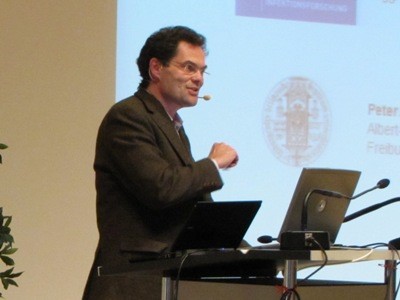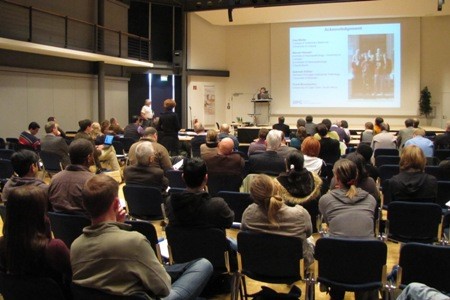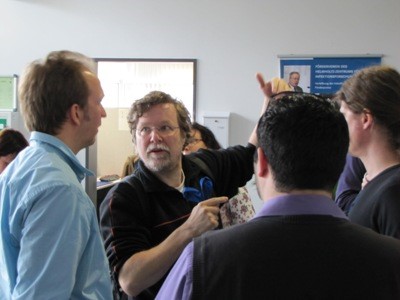
22 and 23 April 2010 at the Helmholtz Centre for Infection Research in Braunschweig
Infections of the central nervous system (CNS), whether of zoonotic origin or vector transmission, require special attention and pose major scientific challenges for researchers. Therefore, the National Research Platform for Zoonoses, on the initiative of Prof. Dr. Dirk Schlüter, together with the Helmholtz Centre for Infection Research in Braunschweig and in cooperation with the Universities of Magdeburg and Cologne, organised a workshop on "Zoonotic and Vector-Borne CNS Infections" on 22 and 23 April 2010. Main topics were the pathogenesis and immunity of CNS infections caused by different pathogens, but also their diagnosis, therapy, epidemiology and clinical management.

Prof. Dr. Dirk Schlüter from the University of Madgeburg highlighted the importance of T-cells, microglia and macrophages for the regulation of toxoplasma-induced encephalitis in his lecture "Regulation of Toxoplasma encephalitis by brain resident cells". Under the title "Immunological control of cerebral cryptococcosis" Prof. Dr. Gottfried Alber (University of Leipzig) presented research results on the immunopathology of cryptococcus meningoencephalitis affecting immunocompromised patients and which can be transmitted by pigeons. Dr. Albrecht Kiderlen of the Robert Koch Institute presented the first case report of balamuthiasis in a gorilla in Germany to the audience and pointed out that these amoebas can occur anywhere and should accordingly be considered as a differential diagnosis. In order to be able to assess the risks of an infection with Balamuthia mandrillaris, further research on the occurrence, path of infection and pathogenetic potential of the so far quite unknown pathogen is urgently needed. In a very descriptive lecture, Prof. Dr. Matthias Gunzer presented new methods for visualizing immune processes inside the body. Using green fluorescent protein, he succeeded in making the movements of immune cells in the CNS of mice visible and comprehensible. Prof. Dr. Martin Groschup from the Friedrich Loeffler Institute used a large-scale pathogenesis study to explain, among other things, how prion proteins find their way from the digestive tract into the CNS along nerve tracts. The subsequent discussion on this topic also showed that zoonoses research in the field of CNS infections should be further developed in order to ensure, among other things, optimal consumer protection.

Numerous other presentations made the workshop a successful event with a total of over 130 participants. Due to the volcanic eruption in Iceland and the resulting cancellations in international air traffic, some participants and speakers were unfortunately prevented from attending the workshop, which led to short-term program changes. We would like to take this opportunity to thank all speakers who reacted flexibly and quickly. The time gained was used for intensive discussions after the presentations and during the breaks.
The program of the workshop can be downloaded here.
Scientific direction:
Wissenschaftliche Leitung:
Prof. Dr. Dirk Schlüter, Otto-von-Guericke-Universität Magdeburg
Prof. Dr. Martina Deckert, Universität Köln
Prof. Dr. Jürgen Wehland, Helmholtz Zentrum für Infektionsforschung
Dr. Siggi Weiß, Helmholtz Zentrum für Infektionsforschung



